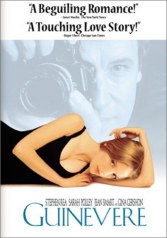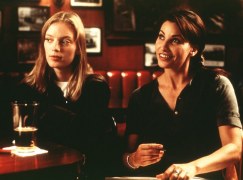| Guinevere |
| |
 |
USA, 1999. Rated R. 104 minutes.
Cast: Sarah Polley, Stephen Rea,
Jean Smart, Gina Gershon, Paul Dooley, Carrie Preston, Tracy Letts, Emily
Procter, Sharon McNight, Gedde Watanabe, Carlton Wilborn, Sandra Oh
Writers: Audrey Wells
Music: Christophe Beck
Cinematographer: Charles Minsky
Producers: Jonathan King, Brad Weston
Director: Audrey Wells
LINKS
|
 kay, feel
free to laugh at me. Before I saw this film, I thought the term “May-December
romance” literally meant that the romance was an eight month fling from Spring
to year’s end. I couldn’t fathom why there were so many romances fitting this
pattern that it justified its own term. But now, by Jove, I think I’ve got it!
In Guinevere, the debut film from The Truth About Cats And Dogs
screenwriter Audrey Wells, young, preternaturally beautiful Sarah Polley gets
romantically entangled with a crusty frumpy artist played by Stephen Rea. Polley
is Harper Sloane, the youngest child in a well-to-do family of lawyers living
in the posh Pacific Heights neighborhood of San Francisco. They meet at Harper’s
sister’s wedding. Harper maladroitly inhabits her bridesmaid’s dress and duties–she
would rather be anywhere but with her relations. Connie Fitzpatrick (Rea) is
obviously just doing this wedding gig for the cash. He’s the official photographer,
and he wins Harper’s favor by deliberately excluding her from the wedding party
photos. These early scenes are promising. They set up Harper’s insecurities
due to familial neglect, and give Connie an alluring openness as a caring mentor.
kay, feel
free to laugh at me. Before I saw this film, I thought the term “May-December
romance” literally meant that the romance was an eight month fling from Spring
to year’s end. I couldn’t fathom why there were so many romances fitting this
pattern that it justified its own term. But now, by Jove, I think I’ve got it!
In Guinevere, the debut film from The Truth About Cats And Dogs
screenwriter Audrey Wells, young, preternaturally beautiful Sarah Polley gets
romantically entangled with a crusty frumpy artist played by Stephen Rea. Polley
is Harper Sloane, the youngest child in a well-to-do family of lawyers living
in the posh Pacific Heights neighborhood of San Francisco. They meet at Harper’s
sister’s wedding. Harper maladroitly inhabits her bridesmaid’s dress and duties–she
would rather be anywhere but with her relations. Connie Fitzpatrick (Rea) is
obviously just doing this wedding gig for the cash. He’s the official photographer,
and he wins Harper’s favor by deliberately excluding her from the wedding party
photos. These early scenes are promising. They set up Harper’s insecurities
due to familial neglect, and give Connie an alluring openness as a caring mentor.
The transition from Connie as mentor to being Harper’s love-daddy is only half-convincing.
From Connie’s standpoint, the movie does a good job of identifying his needs
and desires. The best scene in the movie belongs to Jean Smart, who plays Harper’s
mother. In the scene, she confronts Connie, who is now living with Harper, and
sharply dissects his need for a protégé who will hold him in “awe.”
Connie, it turns out, seduces ingenues regularly–he has a stable of former “Guineveres”
(the name he bestows on his current nubile disciple).  He
rationalizes these relationships as romantic and professional internships. She
will be his muse, and he will in turn awaken her latent talent in the arts.
His bevy of girls all later go on to successful careers in photography or painting,
so he sees it as an even trade with the psychological damage erased by self-discovery.
He
rationalizes these relationships as romantic and professional internships. She
will be his muse, and he will in turn awaken her latent talent in the arts.
His bevy of girls all later go on to successful careers in photography or painting,
so he sees it as an even trade with the psychological damage erased by self-discovery.
The movie doesn’t really take a side as to whether the learning experience
outweighs the mindf***. From Harper’s perspective, she is always asking the
question “why me?” When she learns that she is not the first Guinevere, the
film does little to explain why she stays with Connie. Even in conversations
with Billie (Gina Gershon), a former Guinevere herself, Harper is never advised
to leave Connie. She’s simply regarded with sly bemusement and a “you’ll have
a different perspective when you’re older” attitude. It’s like attraction to
a father figure and the ensuing affair are necessary parts of a maturation process.
Harper doesn’t know this though, and her attraction to Connie remains a mystery,
which is a detriment to the believability of the film. Being underappreciated at
home cannot be the sole cause of seeking solace in the arms of man older than
your parents, otherwise we’d have a massive outbreak of this behavior. Not only
that, there is no indication in Harper’s character that she would be the type
of person who is cut off from all other outlets. Polley does as much as she
can in the role, despite there being insufficient background information to
drive her actions. Does she strike out with people her age? Is Patty her only
friend?
AboutFilm.Com
The Big Picture
|
| Alison |
-
|
| Carlo |
B
|
| Dana |
B-
|
| Jeff |
B-
|
| Kris |
C
|
| ratings explained |
As far as exploring the dynamic of Harper’s relationship with Connie, Guinevere
barely breaks topsoil. The romantic scenes are filmed distantly, and fade to
black the instant they could possibly become creepy. Audrey Wells is so
intent on not judging her characters that we only get a casual observation of
them. Scenes never fully play out. In the initial seduction, we see Connie getting
Harper drunk. A couple of edits later she’s moving in with him. I wanted more–I
wanted complete access. The film is told from the viewpoint of Harper as she
remembers it five years down the road. Does she just block out the icky parts?
The only authentic and alive scene is the confrontation between Harper’s mom
and Connie.
I didn’t like the pat ending device that Wells used. I won’t spoil the details,
but it seemed like a shorthand attempt to reconcile the pain caused by Connie’s
abuse of power. Its effect is embarrassingly goofy and inappropriately mushy.
Connie begins the movie as a charmer, is revealed to be a egotistical loser,
and in the end we’re supposed to feel moved? I felt schadenfreude.
The acting was generally good, especially Sarah Polley in her first leading
role. After her fantastic supporting part in The Sweet Hereafter, she
was underused in eXistenZ and unremarkable in Go. Here she makes
up for her underwritten role with superb body language and vocal inflection
that reveals her vulnerability. Jean Smart is commendable as Deborah Sloan,
an arrogant woman who is threatened by her advancing age but able to call Connie
on his hypocrisy. Stephen Rea (The Crying Game, The
Butcher Boy), the actor with the best written part, is merely adequate.
It is a condition of his face that he always seems to convey the same sad expression,
but I recall earlier roles that were more vigorous and variant.
I’ll give Guinevere a B- because, though it is lacking, what’s
there is worth watching.
Review
© October 1999 by AboutFilm.Com and the author.
Images © 1999 Miramax. All Rights Reserved.

 He
rationalizes these relationships as romantic and professional internships. She
will be his muse, and he will in turn awaken her latent talent in the arts.
His bevy of girls all later go on to successful careers in photography or painting,
so he sees it as an even trade with the psychological damage erased by self-discovery.
He
rationalizes these relationships as romantic and professional internships. She
will be his muse, and he will in turn awaken her latent talent in the arts.
His bevy of girls all later go on to successful careers in photography or painting,
so he sees it as an even trade with the psychological damage erased by self-discovery.
